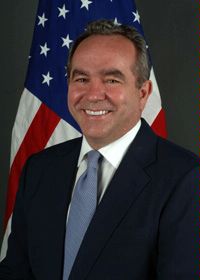China and the United States, in closed-door talks on Monday involving the denuclearization of the Korean Peninsula, paid “particular attention” to Burma’s relations with North Korea, according to a report in the state-run China Daily.
 Co-chaired by US Assistant Secretary of State for East Asian and Pacific Affairs Kurt Campbell and Chinese Deputy Foreign Minister Cui Tiankai at the US Naval Academy in Annapolis, Maryland, the talks were the third round of consultations within 12 months, the paper said. No details were made available.
Co-chaired by US Assistant Secretary of State for East Asian and Pacific Affairs Kurt Campbell and Chinese Deputy Foreign Minister Cui Tiankai at the US Naval Academy in Annapolis, Maryland, the talks were the third round of consultations within 12 months, the paper said. No details were made available.
The talks came shortly after the US and the Democratic People's Republic of Korea held their first meetings on dismantling Pyongyang's nuclear programs and food aid since the death of its former leader Kim Jong-il.
“The sides held constructive discussions regarding developments in the Asia-Pacific region”, and the US reiterated its commitment to “working together to build a cooperative partnership with China and welcomed China playing a more active and positive role in world affairs”, a statement said.
According to an agreement, North Korea would allow the return of International Atomic Energy Agency inspectors in exchange for nutritional shipments from the US.
Mizzima reported in December that when U.S. Secretary of State Hillary Clinton ended her three-day visit to Burma, she welcomed the Burmese government’s promise to break off its military relationship with North Korea.
She told a press conference in Naypyitaw after her meeting with President Thein Sein and other key government officials: “We look to the government to fully implement UN Security Council Resolutions 1718 and 1874, and we support the government’s stated determination to sever military ties with North Korea.” The U.N. resolutions imposed an arms embargo against North Korea.
Secretary Clinton also said that if Burma wants to establish a relationship with the U.S., it must abide by the Nuclear Non-Proliferation Treaty.
In December, a senior U.S. official said in a press conference held in Busan, South Korea, that Clinton would raise the issue of secret ties between Burma and North Korea and the case that Burma reportedly received missile technology from North Korea.
Burmese Lower House speaker and former military leader No. 3, Shwe Mann, said Burma had military ties with North Korea, but he denied it had tried to get North Korean nuclear technology.
“Some allegations said that some officials, including me, went there and signed an agreement regarding nuclear aid. That’s not true,” Shwe Mann said in a press conference in Naypyitaw.
He said that to promote Burma’s defense system, Burma signed a military cooperation agreement with North Korea, and he observed North Korea’s defense systems against air attacks, its ammunition plants and air force and navy operations.
“The U.S. has a very good intelligence system. It has not only people intelligence but also intelligence satellites. When I went to North Korea as a general in the past, the U.S. knew about it. It knows what we were doing,” he said.


